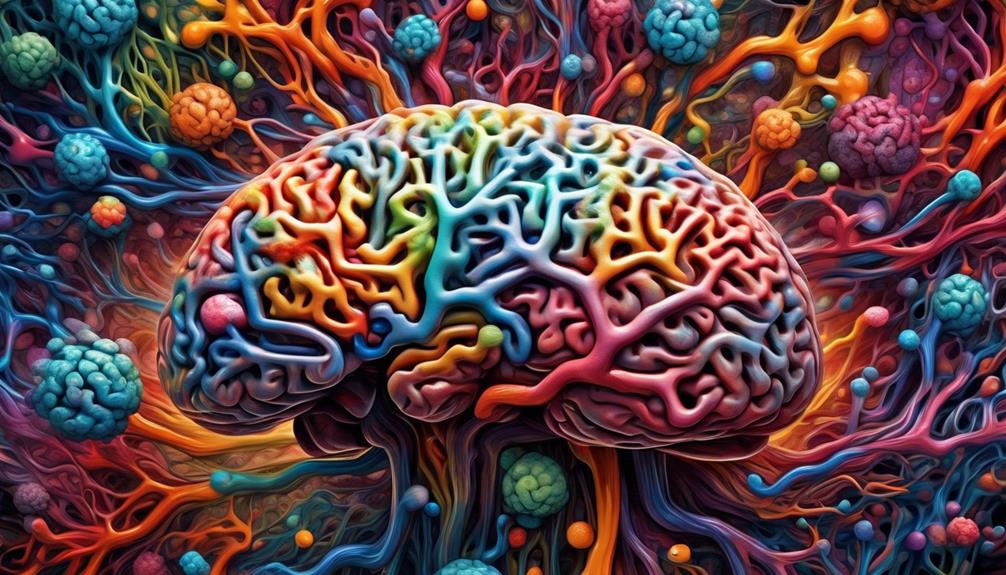Have you ever wondered if those incredible illusions could be caused by a UTI?
The connection between urinary tract infections and hallucinations, especially among the elderly, is a topic that has piqued our interest.
It appears that UTIs may trigger delirium, a state of mental confusion, potentially leading to hallucinations.
The prevalence of confusion and altered mental states in UTI patients, particularly the elderly, hints at a possible correlation that warrants further exploration.
As we explore this intriguing relationship, we uncover the need for more research to shed light on the underlying mechanisms and effective treatment strategies.
Key Takeaways
- UTIs can trigger delirium and lead to hallucinations in elderly patients.
- Blocking IL-6 action may resolve delirium in elderly UTI patients.
- UTIs can cause decline in mental abilities and cognitive impairments.
- Prompt recognition and treatment of UTIs is crucial to prevent hallucinations.
Understanding the Link Between UTIs and Hallucinations
Exploring the connection between urinary tract infections (UTIs) and hallucinations reveals a significant impact on cognitive function and mental health in affected individuals. In older patients, UTIs can lead to delirium, causing a decline in mental abilities and disoriented thinking. Research shows that up to one-third of elderly patients hospitalized with UTIs experience confusion and reduced awareness of their surroundings. Studies conducted by Cedars-Sinai researchers on mice with UTIs have shown higher levels of anxiety and lapses in short-term memory, mirroring symptoms of delirium in humans.
Furthermore, blocking the action of IL-6, a protein that regulates immune response, could potentially resolve delirium in elderly patients with UTIs. This finding opens up possibilities for better understanding and treating the neurological effects of UTIs. The implications of this research extend beyond UTIs, as similar cognitive impairments are observed in conditions like Alzheimer's and Parkinson's diseases, which are also associated with increased UTI incidence.
Understanding this link is crucial for providing holistic care to older individuals experiencing hallucinations due to UTIs.
Impact of UTIs on Brain Function

How do urinary tract infections (UTIs) impact brain function, particularly in elderly patients? UTIs can lead to delirium, causing a decline in mental abilities and disoriented thinking. In fact, up to one-third of elderly patients hospitalized with UTIs experience delirium, resulting in confusion and reduced awareness of their surroundings. A study conducted by Cedars-Sinai on mice with UTIs revealed higher levels of anxiety and lapses in short-term memory, highlighting the significant impact UTIs can have on brain function. Researchers found that blocking the action of IL-6, a protein involved in the immune response, could potentially resolve delirium in elderly patients with UTIs and normalize the brain changes associated with the infection. This research framework could also be applied to studying delirium in other conditions linked to increased UTI incidence, such as Alzheimer's disease and Parkinson's disease.
| Impact of UTIs on Brain Function | |
|---|---|
| UTIs can cause delirium in elderly patients | |
| Delirium affects up to one-third of elderly patients hospitalized with UTIs | |
| Cedars-Sinai study on mice showed higher levels of anxiety and lapses in short-term memory | |
| Blocking IL-6 action could resolve delirium in elderly patients with UTIs |
Recognizing Hallucination Symptoms in UTI Patients
What common symptoms of delirium should healthcare providers be vigilant for in UTI patients, particularly in the elderly population?
- Altered Mental Status: Look for signs of confusion, disorientation, and impaired cognition in UTI patients, as these could indicate the onset of delirium.
- Agitation or Restlessness: Monitor for behaviors such as restlessness, irritability, or unexplained agitation, which may point towards delirium developing.
- Urinary Urgency: Pay attention to complaints of sudden, strong urges to urinate, as urinary urgency can be a symptom associated with delirium in older people with UTIs.
- Hallucinations: Be alert to any reports of sensory experiences that aren't based in reality, as hallucinations can be a manifestation of delirium in UTI patients, especially in the elderly population.
Recognizing these symptoms promptly is crucial for early intervention and appropriate management of delirium in UTI patients, ultimately leading to improved outcomes and quality of care.
Treatment Approaches for UTI-Induced Hallucinations

Having established the importance of recognizing symptoms of delirium in UTI patients, particularly in the elderly, the focus now shifts towards discussing effective treatment approaches for UTI-induced hallucinations.
Antibiotics play a crucial role in treating UTIs, subsequently aiding in alleviating hallucinations. Ensuring patients with UTIs receive adequate sleep and rest is essential to reduce the risk of hallucinations.
In severe cases where UTIs lead to debilitating hallucinations, healthcare providers may consider interventions like antipsychotic or sedative medications. Prompt treatment of the underlying UTI is paramount for resolving hallucinations and preventing further complications.
Close monitoring of symptoms and regular follow-up with healthcare providers are necessary to gauge the effectiveness of treatment for UTI-induced hallucinations. By addressing the UTI promptly and implementing appropriate interventions, healthcare professionals can effectively manage hallucinations associated with UTIs, ultimately improving the patient's well-being and quality of life.
Preventing Hallucinations From UTIs

Prompt recognition and treatment of UTIs is crucial in preventing hallucinations associated with the condition. To effectively prevent hallucinations from UTIs, patients, especially elderly patients, should consider the following:
- Prescription of Antibiotics: Antibiotics play a vital role in treating the UTI itself, which can help alleviate hallucinations linked to the infection.
- Ensuring Adequate Sleep: Sleep deprivation can exacerbate hallucinations, so it's essential to prioritize adequate sleep. Physicians may recommend sleep aids to promote restful sleep and prevent hallucinations induced by lack of sleep.
- Avoiding Inappropriate Medications: In older patients with dementia, medications like Haldol should be avoided as they can worsen hallucinations. It's crucial to choose medications carefully to prevent adverse effects.
- Holistic Treatment Approach: Hospitalists should consider treating UTIs and addressing sleep deprivation in patients experiencing hallucinations, not just focusing on managing the hallucinations themselves. A comprehensive approach can help prevent recurrent hallucinations and improve overall well-being.
Frequently Asked Questions
Why Does a UTI Cause Hallucinations?
When a UTI causes hallucinations, the exact mechanism isn't fully understood. However, factors such as sleep deprivation due to the infection may play a role.
Prompt recognition and treatment of UTIs are vital in preventing and managing hallucinations. Antibiotics and sleep aids can be used to treat UTIs and alleviate hallucinations.
It's important to address UTIs promptly to reduce the risk of hallucinations, especially in vulnerable populations like older adults and those with dementia.
Does Delirium From UTI Go Away?
Yes, delirium from UTI can resolve. Timely treatment of underlying infections and addressing contributing factors like dehydration or medication side effects can lead to improvement.
Close monitoring, supportive care, and appropriate interventions are key in managing UTI-induced delirium. With proper medical attention, many individuals experience a return to baseline cognitive function.
Seeking medical help promptly is crucial for a positive outcome in resolving delirium associated with UTIs.
Can a Urinary Tract Infection Cause Psychosis?
Absolutely, a urinary tract infection can indeed cause psychosis.
In some cases, UTIs can lead to severe cognitive disturbances, including hallucinations and delusions.
It's crucial to promptly address UTIs to prevent such complications.
Seeking medical attention and appropriate treatment for UTIs can help alleviate psychotic symptoms and promote overall well-being.
Early detection and management play a vital role in mitigating the impact UTIs can have on mental health.
Can a UTI Cause Weird Thoughts?
Yes, a UTI can indeed cause strange or unusual thoughts. Changes in mental status, including weird thoughts, can be a symptom of UTIs, especially in vulnerable populations like older adults.
Prompt recognition and treatment are crucial to address these cognitive effects. Antibiotics and rest can aid in treating the infection and improving mental clarity.
Seeking medical attention if experiencing unusual thoughts with a UTI is essential for proper management.
Conclusion
In conclusion, UTIs can indeed cause hallucinations, particularly in elderly patients. Recognizing the impact of UTIs on brain function is crucial in identifying and addressing hallucination symptoms. Prompt treatment of UTIs is essential not only to alleviate physical symptoms but also to reduce the risk of cognitive disruptions such as confusion and hallucinations. Understanding the link between **UTIs and hallucination causes** helps caregivers and healthcare professionals implement appropriate interventions swiftly. Early detection and treatment can significantly improve patient outcomes, particularly in vulnerable populations like the elderly.
Treatment approaches and preventive measures can help manage UTI-induced hallucinations. By understanding the link between UTIs and hallucinations, healthcare providers can better support patients experiencing these symptoms.
Remember, when it comes to UTIs and hallucinations, early detection and intervention are key to promoting optimal outcomes.









